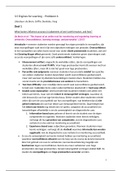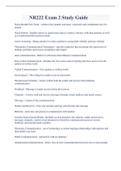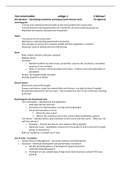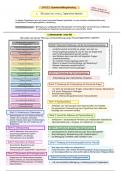child psych continuous doc
Intelligence
🧠 Intelligence refers to a combination of cognitive abilities that enable individuals to understand things,
plan, reason, learn from experiences, problem solve, an effectively interact with the world around them
Charles spearman (1904)
Spearman found that someone who does well on one cognitive test they tend to do well on other test to
he called this ‘general intelligence’ which he referred to as ‘g’
he later identified specific forms on intelligence (such as maths and logic) which he referred to as ‘s’
diagram of his model
John Horn and Raymond Cattell (1966)
Horn and Cattell suggested that intelligence is not just a single ‘g’ factor but that it has two main parts: fluid and
crystallised
child psych continuous doc 1
, Fluid intelligence - ability to reason in abstract ways and solve problems logically without experience
Crystallised intelligence - Ability to quire knowledge through learning and experience
Howard Gardner (1983)
Gardner argued that there are eight separate intelligences that we all posses but in greater or lesser amounts.
some of these intelligences are valued higher in different cultures such as verbal-linguistic but in other cultures
intelligence types such as naturalistic have greater status
Types of
Example
Intelligence
skills of reading, writing and using language
verbal-linguistic
effectively
logical- the ability to recognize patterns and relationships and
mathematical apply them to solving problems
bodily coordination of bodily movements as well as the
kinaesthetic dexterity and control of objects
listening to music as well as making it or singing it
musical
accurately
problems solving through visual perception and
visual-spatial
manipulation
self awareness and internally driven behaviours such
intrapersonal
as motivation
interpersonal effective communication skills with others
people who have this are more in touch with nature
naturalistic and interested in discovering and learning about the
environment
Genetic Factors
genetics are a factor that have been proposed to affect intelligence this area is highly studied and researched into
via the use of twin and adoption studies
previous twin studies found a genetic contribution to intelligence and estimated that it accounts for between
25% and 50% of intelligence (Leeuwen et al 2017)
Scarr and Weinberg (1978) conducted a study to compare the intelligence levels and intellectual abilities
between biological parents and children and adopted, from this study they found stronger correlations
between biological suggesting a genetic link
Plomin and Defries (1998) compared MZ and DZ twins on a measure of spatial ability and demonstrated that
scores among MZ twins were far more similar
this effect has also been demonstrated in twin studies where MZ twins have been raised apart in
comparison to DZ twins who have been raised together (scar 1997)
Prenatal Development- Birth, Nutrition and Toxic Substances
💡 research has shown that influences on prenatal developments can affect intelligence
premature babies and nutrition
premature babies who were breastfed were seen to have higher cognitive abilities at ages 7-8 than premature
babies who were bottle-fed
however Der et al (2006) found little to no impact
the differences between these results suggest that premature babies development of cognitive skills are more
susceptible to the impact of nutrition that full term babies
child psych continuous doc 2
Intelligence
🧠 Intelligence refers to a combination of cognitive abilities that enable individuals to understand things,
plan, reason, learn from experiences, problem solve, an effectively interact with the world around them
Charles spearman (1904)
Spearman found that someone who does well on one cognitive test they tend to do well on other test to
he called this ‘general intelligence’ which he referred to as ‘g’
he later identified specific forms on intelligence (such as maths and logic) which he referred to as ‘s’
diagram of his model
John Horn and Raymond Cattell (1966)
Horn and Cattell suggested that intelligence is not just a single ‘g’ factor but that it has two main parts: fluid and
crystallised
child psych continuous doc 1
, Fluid intelligence - ability to reason in abstract ways and solve problems logically without experience
Crystallised intelligence - Ability to quire knowledge through learning and experience
Howard Gardner (1983)
Gardner argued that there are eight separate intelligences that we all posses but in greater or lesser amounts.
some of these intelligences are valued higher in different cultures such as verbal-linguistic but in other cultures
intelligence types such as naturalistic have greater status
Types of
Example
Intelligence
skills of reading, writing and using language
verbal-linguistic
effectively
logical- the ability to recognize patterns and relationships and
mathematical apply them to solving problems
bodily coordination of bodily movements as well as the
kinaesthetic dexterity and control of objects
listening to music as well as making it or singing it
musical
accurately
problems solving through visual perception and
visual-spatial
manipulation
self awareness and internally driven behaviours such
intrapersonal
as motivation
interpersonal effective communication skills with others
people who have this are more in touch with nature
naturalistic and interested in discovering and learning about the
environment
Genetic Factors
genetics are a factor that have been proposed to affect intelligence this area is highly studied and researched into
via the use of twin and adoption studies
previous twin studies found a genetic contribution to intelligence and estimated that it accounts for between
25% and 50% of intelligence (Leeuwen et al 2017)
Scarr and Weinberg (1978) conducted a study to compare the intelligence levels and intellectual abilities
between biological parents and children and adopted, from this study they found stronger correlations
between biological suggesting a genetic link
Plomin and Defries (1998) compared MZ and DZ twins on a measure of spatial ability and demonstrated that
scores among MZ twins were far more similar
this effect has also been demonstrated in twin studies where MZ twins have been raised apart in
comparison to DZ twins who have been raised together (scar 1997)
Prenatal Development- Birth, Nutrition and Toxic Substances
💡 research has shown that influences on prenatal developments can affect intelligence
premature babies and nutrition
premature babies who were breastfed were seen to have higher cognitive abilities at ages 7-8 than premature
babies who were bottle-fed
however Der et al (2006) found little to no impact
the differences between these results suggest that premature babies development of cognitive skills are more
susceptible to the impact of nutrition that full term babies
child psych continuous doc 2










